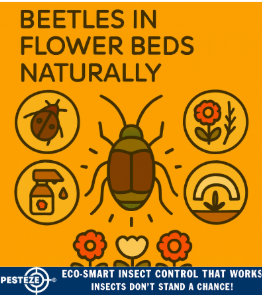HOW TO PREVENT BEETLES IN FLOWER BEDS NATURALLY

HOW TO PREVENT BEETLES IN FLOWER BEDS NATURALLY
SUMMARY
Beetles can quickly damage flower beds by feeding on leaves, petals, and roots, leaving plants weak and unattractive. From Japanese beetles to flea beetles, infestations can spread fast if not controlled. With natural repellents, healthy soil practices, and physical barriers, you can protect your flower beds and keep them vibrant all season long.
FEATURES
-
Handpick Beetles – Remove beetles early in the morning and drop them into soapy water.
-
Use Mulch Wisely – Apply mulch to retain soil moisture while discouraging beetle larvae.
-
Companion Planting – Marigolds, garlic, and catnip naturally repel beetles.
-
Apply Neem Oil or Diatomaceous Earth – Safe, eco-friendly deterrents against beetles.
-
Encourage Natural Predators – Birds, ladybugs, and parasitic wasps reduce beetle numbers.
-
Maintain Healthy Soil – Strong root systems help flowers resist beetle stress.
GUIDE DESCRIPTION
Flower beds are often targets for beetles, which feed on leaves, blossoms, and roots. Whether it’s Japanese beetles chewing on roses or flea beetles attacking young plants, these pests can cause significant damage. The good news is that you can prevent beetles naturally with simple and effective strategies.
Start by handpicking beetles from plants in the early morning when they are less active. Drop them directly into soapy water to reduce populations quickly without chemicals.
Mulching flower beds not only helps retain soil moisture but also discourages beetle larvae from thriving. Choose organic mulch like wood chips or straw and refresh it as needed to maintain effectiveness.
Companion planting is another valuable tool. Flowers and herbs like marigolds, garlic, tansy, and catnip produce scents that beetles dislike. Interplanting these with your decorative flowers adds beauty while creating a natural barrier.
Neem oil is an excellent natural repellent. Spray diluted neem oil directly on leaves to disrupt beetle feeding and reproduction. Alternatively, sprinkle diatomaceous earth around flower bases. This fine powder is safe for people and pets but abrasive to beetles, reducing their presence in beds.
Encouraging natural predators helps keep beetle numbers under control. Birds, ladybugs, frogs, and beneficial insects like parasitic wasps prey on beetles and larvae. Adding birdbaths, native flowers, or insect hotels creates a more balanced ecosystem.
Finally, maintaining healthy soil ensures plants grow strong and can resist beetle damage. Regularly enrich soil with compost, water consistently, and avoid overcrowding plants to reduce stress and vulnerability.
By combining handpicking, mulching, companion planting, natural repellents, predator support, and soil care, you can prevent beetles from infesting your flower beds. These eco-friendly approaches protect your blooms naturally, helping your garden stay colorful, healthy, and pest-free.
- Shashank Rongali


Comments 0